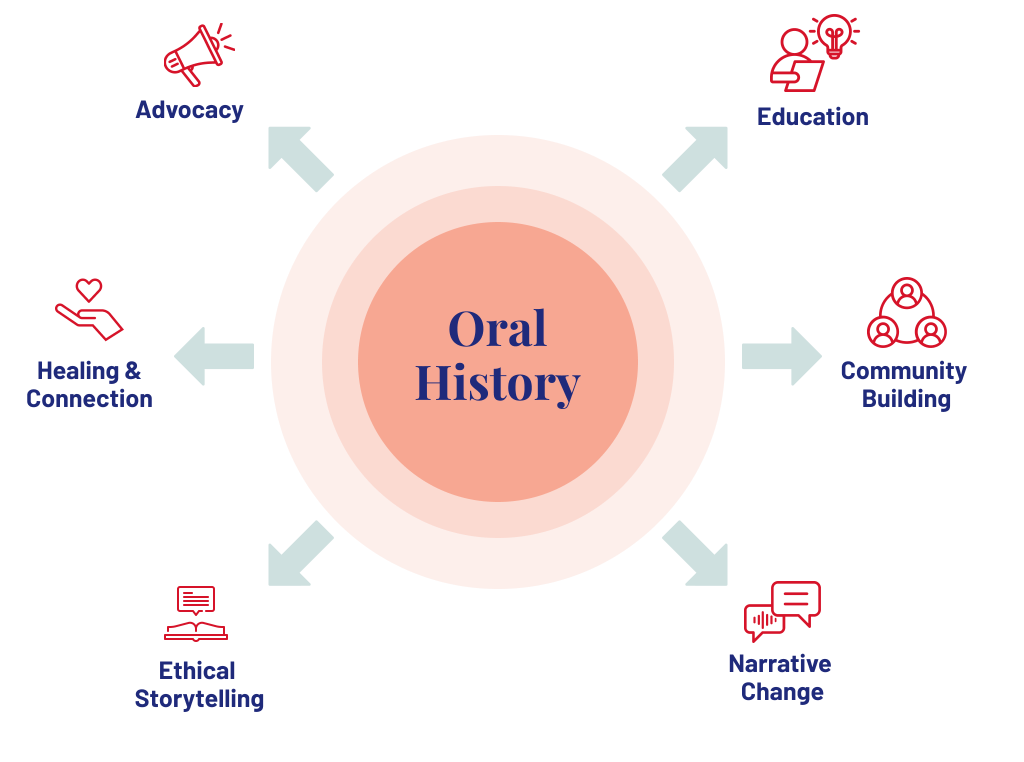“Recounting our experiences gives us mastery over them.”
Anna Lembke Dopamine Nation
I am a lover of memoirs. The first-person narrative is a straight shot into someone’s world, what they see, smell, and taste – all of the memories that inform the architecture of their perspective. Testimonials, witnessing, and recounting all gather together under the umbrella of the power of storytelling.
On road trips, my family and I listen to episodes of The Moth Story Hour. We see ourselves and our experiences in some of these narratives. We laugh out loud. Some of these stories make their way into our hearts, we re-tell, share the episode and, in doing so, say to another person, “we saw you in this story”. Stories connect people and because of this, they are powerful hyperlinks.
Storytelling and Place
The National Parks Service is host to several oral history projects such as The Oral History collections of the Golden Gate National Recreation Area which includes former military sites such as Fort Mason and the Presidio as well as Alcatraz, home of the famous federal prison and the site of the American Indian occupation that began in 1969. San Francisco has changed so much in the last 100 years. Having footholds on place through these diverse voices gives it form and texture.
The Institute of Oral History in El Paso, Texas contains over 1,600 stories about the Mexico border that spans several generations. It exists as a counternarrative to the current politicization and maligning of the southern border. These stories give voice to the border: “Oral history is about memory and lived experiences. It is about listening and being heard. It is about the past and how people give meaning to the past.” Without oral histories, the border is at risk of becoming a symbol – dehumanized, objectified, and distant rather than a complex and vibrant ecosystem and an evolving culture that has existed for centuries. “Crossing the border represents layers of meaning, sometimes contradictory. The act of crossing represents hope, freedom,adventure, fear, and anxiety. The memories and meaning are embedded in the bridge itself.”
Storytelling and Healing
Voices of Witness (VOW) is an oral history project that partners with community organizations in the San Francisco Bay Area and beyond. VOW uplifts voices that often go unheard, acknowledging the relationship between storytelling and healing, saying: “Narrators are the experts of their lived experiences, and those who are most deeply impacted are at the heart of solutions to address injustice. Oral history storytelling can make space for stories that otherwise might not be heard and create a platform for narrators impacted by—and fighting against—inequity to share their expertise. Approach projects with humility and an expectation of ongoing learning. This creates an opening for the narrator to teach and the interviewer to listen deeply.” This approach, which emphasizes conversation, listening, and exchange outside of hierarchical models, feels deeply connected to the work of The Hyperlinked Library.
Storytelling is a large umbrella and there is room for everyone underneath. Let the archives fill with testimonials! I saw this. I walked these streets. I was here. My voice matters.
May it shine into the heart of another who needs to hear it.

References
Institute of Oral History. (n.d.). Retrieved on April 13, 2025, from https://www.utep.edu/liberalarts/oral-history/about/vision-mission.html
Lembke, A. (2021). Dopamine nation: Finding balance in the age of indulgence. Penguin Random House.
Voices of Witness. (n.d.) Why is oral history a valuable tool? [infographic]. Voices of Witness. Retrieved on April 12, 2025, from https://voiceofwitness.org/about/benefits-of-oral-history/
@borges25 Thank you for this reflection. I heart this:
I saw this. I walked these streets. I was here. My voice matters.
May it shine into the heart of another who needs to hear it
And your take on conversation being deeply connected to our model of library service is spot on. Early presentations I used to do with colleague Jenny Levine were all about the importance of conversation via all channels available to us – tech or otherwise!